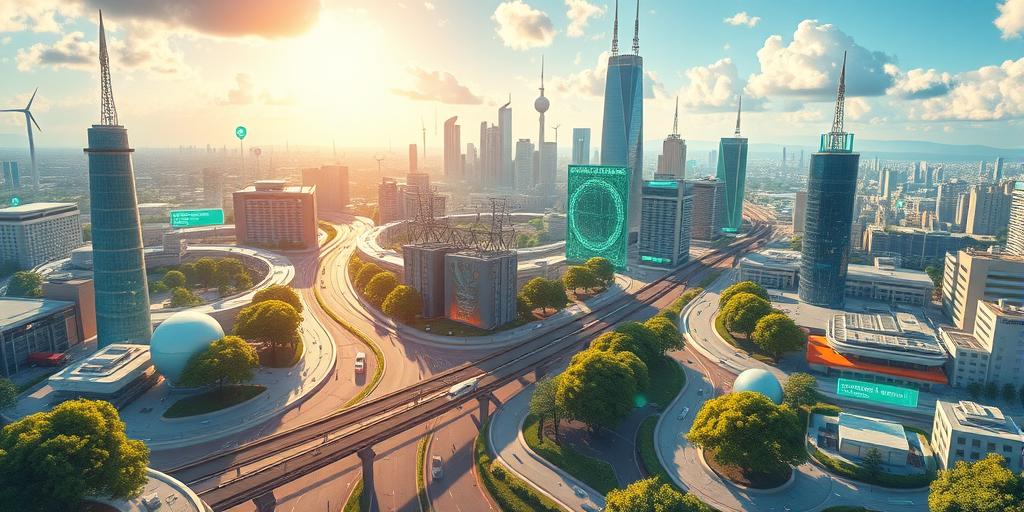Are you ready to uncover the secrets to a cleaner, brighter tomorrow? Prepare to be amazed as we delve into the fascinating world of the Internet of Things (IoT) and its transformative power in creating a sustainable future. From smart homes that minimize waste to industrial-scale efficiency improvements, IoT is revolutionizing how we live and interact with our environment. Let’s explore the incredible ways IoT is paving the path towards a cleaner and better world for all.
Smart Homes: The Eco-Friendly Revolution
Smart homes aren’t just about convenience; they’re becoming eco-warriors in the fight for sustainability. Imagine a home that automatically adjusts its energy consumption based on your habits and real-time data. IoT devices like smart thermostats, lighting systems, and appliances seamlessly integrate to optimize energy use, reducing your carbon footprint and your energy bills. Smart irrigation systems use sensors to monitor soil moisture and water plants only when necessary. This prevents water waste and reduces the strain on local water resources. That’s the power of IoT transforming the way we manage our resources in our personal spaces! Beyond this, smart recycling systems can automatically sort waste, increasing the efficiency of our waste management systems.
Smart Appliances: Reducing Waste and Energy Consumption
Smart refrigerators can track food expiration dates, minimizing food waste. Smart washing machines and dishwashers optimize water and energy use, reducing your environmental impact. The use of smart power strips allows for the monitoring and control of electricity consumption at a device level, giving you better insight into which of your appliances and electronics use the most energy. Consider that even small changes can generate big differences in your environmental footprint.
Energy Efficiency and Monitoring: Real-Time Insights for a Greener Home
Smart meters provide real-time data on energy consumption, enabling homeowners to identify areas for improvement and make informed decisions about energy conservation. This can empower you to make conscious choices about your consumption habits. IoT devices can communicate with each other to streamline and automate these energy savings and efficiency improvements. Imagine the impact when this technology is spread to millions of homes across the world. The possibilities are endless.
Smart Cities: A Sustainable Urban Future
The next level of IoT implementation is in the creation of smart cities. These futuristic urban environments leverage IoT devices to optimize resource management, reduce pollution, and enhance the overall quality of life. This creates a positive feedback loop wherein sustainability initiatives are facilitated by IoT, generating environmental improvements that reinforce a commitment to this technology.
Optimizing Waste Management: A Cleaner and More Efficient Approach
Smart bins equipped with sensors monitor fill levels, optimizing waste collection routes and reducing the number of unnecessary trips. This reduces fuel consumption, greenhouse gas emissions, and helps to create cleaner cities. The implementation of such systems can significantly improve a city’s waste management processes, leading to a cleaner and more efficient urban landscape.
Reducing Traffic Congestion: Smart Traffic Management Systems
Smart traffic management systems use sensors and data analytics to optimize traffic flow, reducing congestion and emissions. The resulting reduction in fuel consumption and idling time leads to a significant decrease in harmful emissions released into the air. The improvements in traffic flow can also lead to reduced commute times and improved air quality throughout a city.
Enhancing Air Quality Monitoring: Real-time Data for Better Decision-Making
IoT sensors monitor air quality in real-time, providing critical data for environmental agencies to make informed decisions about pollution control. This continuous monitoring allows for quick identification of pollution hotspots, providing opportunities for timely intervention. The result is a dramatic improvement in the environmental quality of life throughout the city.
IoT in Industries: Efficiency and Sustainability
IoT’s impact extends far beyond our homes and cities. Industries are adopting IoT solutions to optimize resource management, reduce waste, and improve sustainability. It’s a revolution in optimizing processes and efficiency, reducing resource expenditure and pollution.
Precision Agriculture: Optimizing Resource Use
Smart sensors monitor soil conditions, weather patterns, and crop health, enabling farmers to optimize irrigation, fertilization, and pest control. This results in reduced water and fertilizer use, reducing the environmental impact of farming while increasing output and efficiency.
Smart Manufacturing: Reducing Waste and Emissions
Smart factories use sensors and data analytics to monitor equipment performance, optimize energy use, and reduce waste. The resulting optimization in processes and efficiency decreases energy consumption and resource waste, improving the sustainability of manufacturing processes.
Supply Chain Optimization: Reducing Transportation Emissions
IoT devices track goods throughout the supply chain, optimizing logistics and reducing transportation emissions. This improvement in logistics leads to a significant reduction in the environmental impact associated with shipping and freight transportation.
Embrace the power of IoT to make a real difference in the world. By embracing innovation and sustainability, we can leave a better future for generations to come. Join us in creating a cleaner, better future today!




